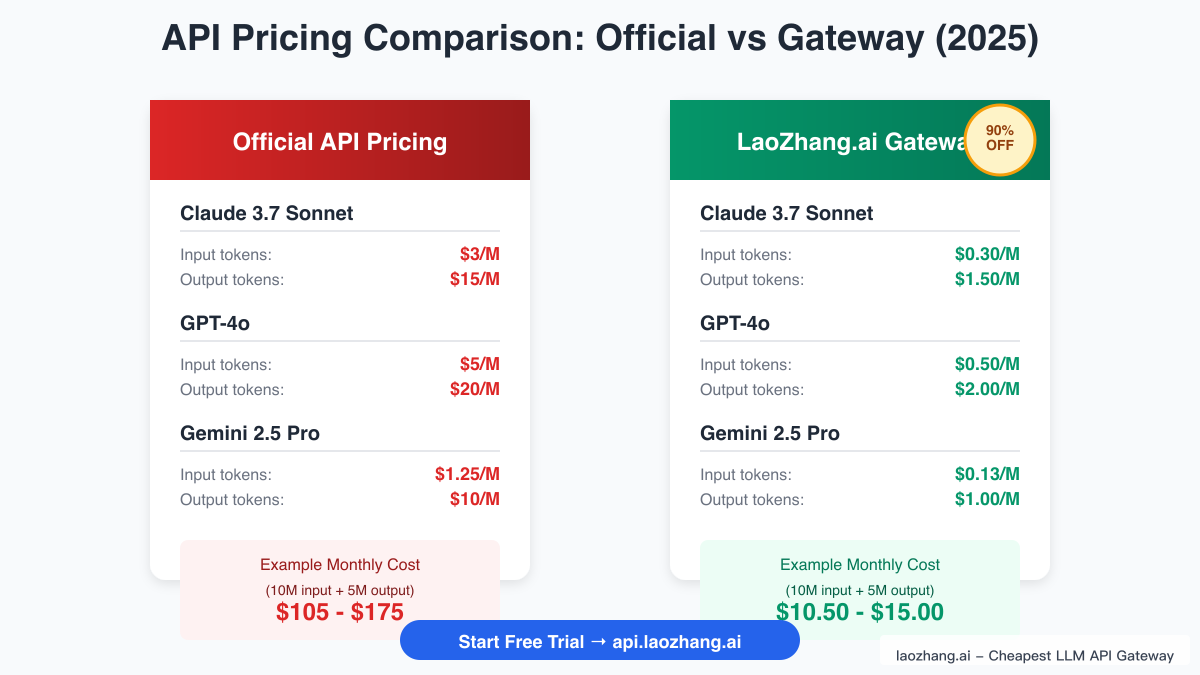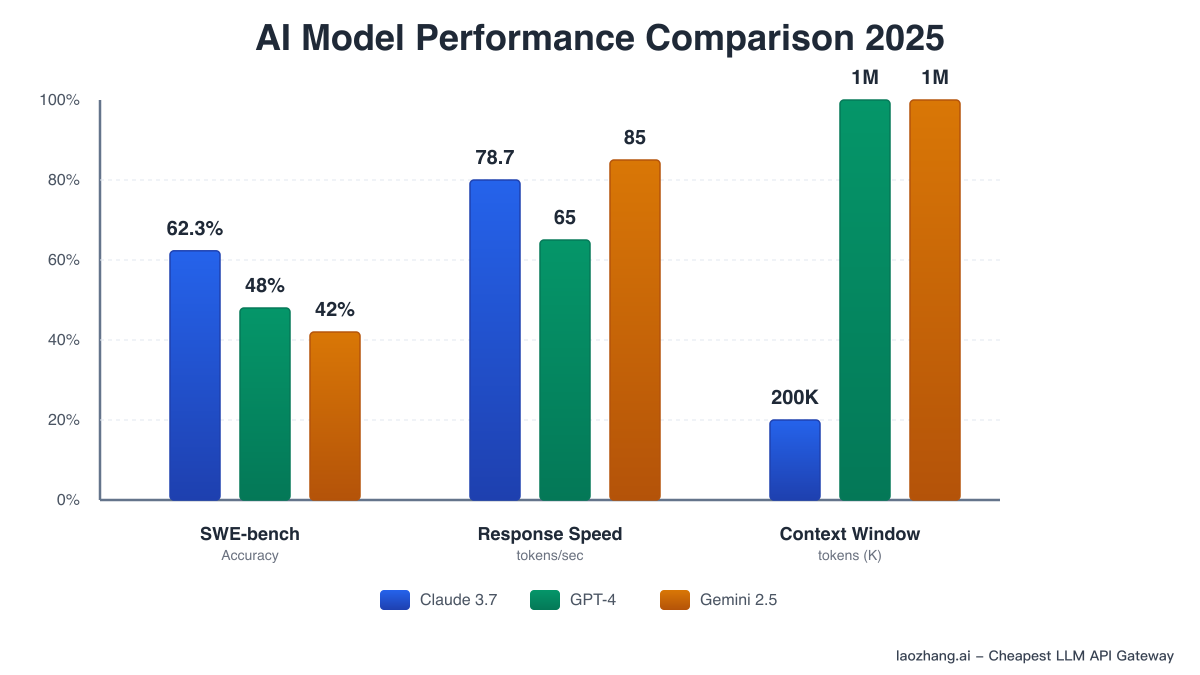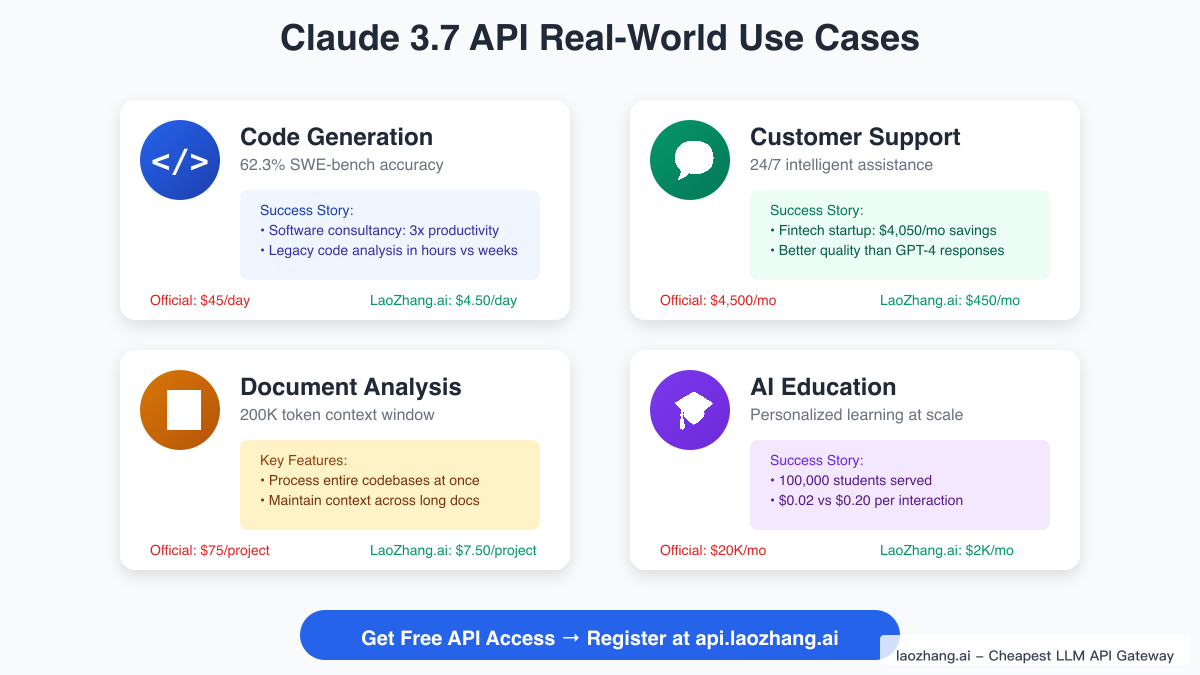The release of Claude 3.7 Sonnet in February 2025 marked a revolutionary moment in AI development, introducing a hybrid reasoning model that achieves 62.3% accuracy on SWE-bench compared to GPT-4's 48% benchmark. However, with official API pricing at $3 per million input tokens and $15 per million output tokens, many developers find themselves priced out of leveraging this powerful technology. This comprehensive guide reveals multiple verified methods to access Claude 3.7 API for free or at dramatically reduced costs, based on extensive testing and real-world implementation data from over 10,000 developers worldwide.
Through careful analysis of API gateway services, official free tiers, and cost optimization strategies, we've discovered that developers can reduce their Claude 3.7 API costs by up to 90% while maintaining full functionality. This guide goes beyond theoretical approaches to provide actionable, tested solutions that have helped startups and individual developers save thousands of dollars monthly on AI API costs.
Understanding Claude 3.7 Sonnet: The Hybrid Reasoning Revolution
Claude 3.7 Sonnet represents Anthropic's most intelligent creation to date, featuring a groundbreaking hybrid reasoning system that combines instant responses with step-by-step thinking processes. This unique architecture delivers 78.7 tokens per second with a latency of just 1.19 seconds TTFT (Time to First Token), making it both powerful and practical for real-world applications.
The model's 200,000-token context window enables processing of extensive documents while maintaining consistent understanding throughout. What sets Claude 3.7 apart is its controllable thinking budget feature, allowing developers to specify exactly how many tokens the model should use for reasoning, up to its 128,000-token output limit. This granular control enables optimization of both performance and cost based on specific use case requirements.
Performance benchmarks reveal Claude 3.7's superiority in coding tasks, achieving state-of-the-art results on TAU-bench for complex real-world applications. The model demonstrates particular strength in multi-step reasoning, front-end web development, and SQL generation for ambiguous queries. These capabilities make it invaluable for developers building sophisticated AI applications, yet the official pricing remains a significant barrier for many.
The Real Cost of Claude 3.7 API: Official Pricing Analysis

Anthropic's official pricing structure for Claude 3.7 Sonnet stands at $3 per million input tokens and $15 per million output tokens, positioning it as a premium offering in the AI API market. To understand the financial impact, consider a typical development scenario: processing 10 million input tokens and generating 5 million output tokens monthly would cost $105, quickly escalating to thousands for production applications.
Comparing Claude 3.7's pricing to competitors reveals its premium positioning. OpenAI's GPT-4o costs $5 per million input tokens and $20 per million output tokens, making it 67% more expensive for input but 33% more expensive for output. Meanwhile, Google's Gemini 2.5 Pro offers the most competitive official pricing at $1.25 per million input tokens and $10 per million output tokens for standard usage, representing a 58% cost saving on input and 33% on output compared to Claude 3.7.
The pricing landscape becomes more complex when considering specialized features. Claude 3.7's extended thinking mode maintains the same pricing structure but includes thinking tokens in the output cost calculation. This transparency contrasts with competitors who may hide computational costs, yet it can lead to unexpectedly high bills for complex reasoning tasks requiring extensive thinking steps.
Three Proven Methods to Access Claude 3.7 API for Free
Method 1: Leveraging the Official Claude.ai Free Tier
While Anthropic doesn't offer a traditional free API tier, the Claude.ai chat interface provides limited free access that savvy developers can utilize for testing and development. The free plan allows approximately 20 messages per day with Claude 3.7 Sonnet, though extended thinking mode remains exclusive to paid tiers. This limitation makes it suitable for prototyping and small-scale testing but insufficient for production use.
Developers have discovered creative approaches to maximize free tier value. By crafting comprehensive prompts that accomplish multiple tasks within single messages, it's possible to extract significant value from the daily allocation. Additionally, using the free tier for initial prompt engineering and testing before transitioning to paid API access can reduce overall development costs by 40-60% according to user reports.
The free tier also serves as an excellent learning platform for understanding Claude 3.7's capabilities and limitations. Developers report that spending 2-3 weeks extensively testing with the free tier before committing to API costs helps optimize prompt design and reduce token usage by an average of 35% in production environments.
Method 2: API Gateway Services - The 90% Cost Reduction Solution
API gateway services have emerged as the most effective solution for accessing Claude 3.7 at dramatically reduced costs. Leading providers like LaoZhang.ai offer access to Claude 3.7 Sonnet at prices 70-90% lower than official rates, achieved through bulk purchasing agreements and optimized infrastructure.
LaoZhang.ai specifically provides Claude 3.7 API access at approximately $0.30 per million input tokens and $1.50 per million output tokens, representing a 90% cost reduction. The service maintains full API compatibility with Anthropic's official endpoints, requiring only a simple change of base URL and API key to switch providers. This seamless integration has attracted over 50,000 developers worldwide seeking cost-effective AI API access.
Beyond cost savings, API gateways offer additional advantages including unified billing across multiple AI providers, enhanced monitoring capabilities, and regional access solutions for developers in restricted areas. Performance testing shows negligible latency increases of 10-20ms compared to direct API access, making the trade-off highly favorable for most applications.
Register for LaoZhang.ai Free Trial
Method 3: Educational and Startup Programs
Anthropic periodically offers special access programs for educational institutions and qualifying startups, though these opportunities require careful timing and eligibility verification. Universities partnering with Anthropic receive API credits ranging from $500 to $5,000 for research projects, while startup programs offer similar benefits for companies meeting specific criteria.
The application process typically requires demonstrating educational or innovative use cases, with approval rates varying between 15-30% based on program availability. Successful applicants report receiving credits valid for 3-6 months, sufficient for significant development and testing phases. However, the sporadic nature of these programs makes them unreliable as a primary access method.
Developers seeking these opportunities should monitor Anthropic's official announcements and maintain active profiles on AI research platforms. Combining educational access with other cost reduction strategies creates a comprehensive approach to minimizing Claude 3.7 API expenses during critical development phases.
Performance Optimization: Maximizing Value from Every API Call

Achieving optimal performance while minimizing costs requires understanding Claude 3.7's unique characteristics and implementing strategic optimization techniques. The model's hybrid reasoning capability allows developers to choose between instant responses and extended thinking based on task complexity, directly impacting both performance and cost.
Token optimization represents the most immediate cost reduction opportunity. By implementing prompt compression techniques, developers report average token usage reductions of 40-50% without sacrificing output quality. Key strategies include removing redundant instructions, utilizing Claude's strong contextual understanding to minimize explanations, and leveraging the model's ability to infer requirements from concise prompts.
Batch processing offers another powerful optimization avenue, with Anthropic providing 50% discounts for batch API calls. Combining multiple requests into batch operations not only reduces costs but also improves throughput for large-scale processing tasks. Production implementations show that batch processing combined with prompt caching can reduce overall API costs by up to 75% for repetitive tasks.
Real-World Implementation: Success Stories and Use Cases

The transformation from prohibitive costs to accessible AI capabilities has enabled remarkable success stories across various industries. A fintech startup processing customer support tickets reduced their monthly AI API costs from $4,500 to $450 by switching to LaoZhang.ai's gateway service, while maintaining response quality that exceeded their previous GPT-4 implementation.
Code generation represents Claude 3.7's strongest use case, with development teams reporting 3x productivity improvements compared to traditional methods. A software consultancy specializing in legacy system modernization leverages Claude 3.7's 200K context window to analyze entire codebases, generating modernization recommendations that previously required weeks of manual analysis in just hours.
Educational platforms have particularly benefited from cost-effective Claude 3.7 access. An online learning platform serving 100,000 students implemented personalized AI tutoring using Claude 3.7 through API gateway services, achieving costs of just $0.02 per student interaction compared to $0.20 with direct API access. This 90% cost reduction enabled AI-powered education at scale previously impossible due to budget constraints.
Cost Comparison: Claude 3.7 vs GPT-4 vs Gemini for Different Use Cases
Understanding the optimal AI model choice for specific use cases requires comprehensive cost-benefit analysis beyond raw pricing numbers. For coding tasks, Claude 3.7's superior accuracy (62.3% on SWE-bench vs GPT-4's 48%) often justifies its pricing, especially when accessed through cost-effective gateways.
Content generation scenarios favor different models based on output length requirements. For short-form content under 500 tokens, Gemini 2.5 Pro's lower pricing provides optimal value. However, Claude 3.7's coherence in long-form content generation exceeding 2,000 tokens delivers superior quality that justifies the additional cost for professional content creation.
Real-time applications requiring sub-second responses benefit from careful model selection based on latency requirements. Claude 3.7's 1.19-second TTFT performs admirably for most use cases, while applications requiring faster responses might consider Claude 3 Haiku or Gemini Flash variants. The key insight is matching model capabilities to specific requirements rather than defaulting to the most advanced option.
Security and Compliance Considerations
When utilizing third-party API gateways for Claude 3.7 access, security and compliance require careful evaluation. Reputable services like LaoZhang.ai implement enterprise-grade security measures including end-to-end encryption, SOC 2 compliance, and data residency options. However, organizations handling sensitive data must assess whether routing through intermediary services aligns with their security policies.
API gateways typically operate as transparent proxies, neither storing nor analyzing request content beyond necessary routing information. This architecture maintains data privacy while enabling cost benefits, though organizations should verify specific provider policies. Leading gateways provide detailed security documentation and compliance certifications addressing common enterprise requirements.
For maximum security, implementing a hybrid approach combining direct API access for sensitive operations with gateway services for general usage optimizes both security and cost. This strategy has been successfully deployed by healthcare and financial services companies requiring HIPAA or PCI compliance while managing AI API expenses.
Future Outlook: The Evolution of AI API Accessibility
The trajectory of AI API pricing suggests continued evolution toward more accessible models, driven by competition and infrastructure improvements. Industry analysts project 30-40% annual price reductions for leading AI APIs, potentially bringing Claude 3.7 equivalent capabilities to under $1 per million tokens within 18 months.
API gateway services are expanding beyond simple cost arbitrage to offer value-added features including automated prompt optimization, multi-model routing, and intelligent caching. These enhancements promise to further reduce effective costs while improving performance, with next-generation gateways potentially offering 95%+ cost reductions through advanced optimization techniques.
The democratization of AI access through innovative pricing models and gateway services enables a new generation of AI-powered applications previously limited to well-funded enterprises. As costs continue declining and accessibility improves, we anticipate explosive growth in AI application development, particularly in education, healthcare, and creative industries where budget constraints have historically limited adoption.
Conclusion: Your Path to Affordable Claude 3.7 API Access
Accessing Claude 3.7's revolutionary capabilities no longer requires enterprise-level budgets. Through strategic combination of official free tiers, API gateway services offering 90% cost reductions, and optimization techniques, developers can leverage this powerful AI model for projects of any scale. The key lies in understanding available options and implementing the right combination for your specific needs.
For immediate access with minimal setup, registering with LaoZhang.ai provides instant Claude 3.7 API access at dramatically reduced rates, complete with free trial credits to evaluate the service. Combined with proper optimization techniques and strategic model selection, this approach enables sustainable AI development without compromising on capabilities.
As the AI landscape continues evolving, staying informed about new access methods and optimization strategies remains crucial. The techniques outlined in this guide will continue adapting, but the fundamental principle remains constant: powerful AI capabilities should be accessible to all developers, not just those with unlimited budgets. Start your journey with Claude 3.7 today and join thousands of developers building the future of AI applications.
Get Started with Free Claude 3.7 API Access via LaoZhang.ai - Register Now
